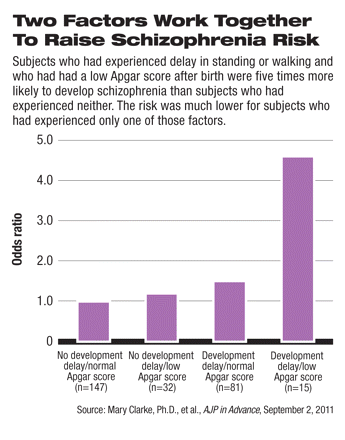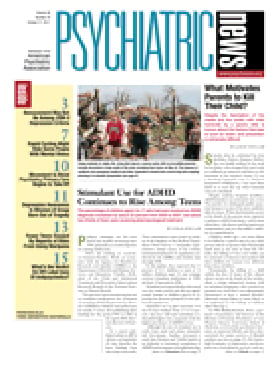Most infants who are late standing or walking will not later develop schizophrenia, nor will most infants who experience fetal distress as defined by an Apgar score of 8 or less. But experiencing both late standing or walking as well as fetal distress increases the risk of schizophrenia fivefold.
This finding, from European researchers, was published online in AJP in Advance on September 2. The senior researcher was Mary Cannon, M.D., an associate professor of psychiatry at the Royal College of Surgeons in Ireland.
The study was made possible by the extensive and interlinked birth, hospital, and health records that the Scandinavians—in this case, the Finns—keep. The initial cohort included all individuals born in Helsinki from 1962 to 1969.
The researchers examined subjects' hospital and health records and identified 189 individuals who had received a diagnosis of schizophrenia as well as 189 same-gender individuals who had been born in the same year but had not been diagnosed with schizophrenia. Birth and developmental data for those with and without the illness were compared.
Delayed attainment of motor milestones between the ages of 6 months and 1 year—such as sitting unsupported, standing without support, or walking without support—increased the risk of later developing schizophrenia in a dose-response manner. Individuals who sat, stood, or walked later than the earliest developers had on average a two- to threefold increased chance of developing schizophrenia. Moreover, the greater the number of milestones on which an individual was delayed, the greater the odds of developing schizophrenia.
In contrast, when the researchers used subjects' Apgar scores after birth as a global measure of fetal distress, they found no significant link between subjects' Apgar scores and schizophrenia risk (although the effect was in that direction). However, individuals who had experienced both motor development delay and an Apgar score of 8 or less were found to be at fivefold greater risk of developing schizophrenia than subjects who had experienced neither.
It thus appears that fetal distress may interact with developmental delay to further increase vulnerability to schizophrenia, the researchers concluded.
With regard to clinical implications, Cannon told Psychiatric News, "the study shows that schizophrenia is a very complex disorder and that rather than examining risk factors in isolation, we need to start considering interactions between them. This may give us greater insights into the mechanisms involved. The study also reminds us of the importance of early life—especially the prenatal period—in the development of both mental and physical disorders. Optimizing fetal health and obstetric outcomes will have beneficial effects on both mental and physical health in adulthood."
"Many studies focus on either obstetric complications or early developmental delays independent of each other, such that it is hard to see the connection," Peter Buckley, M.D., dean of the Medical College of Georgia and a psychiatrist familiar with Cannon's work, told Psychiatric News. "Dr. Cannon and her colleagues show an intriguing ‘dose-response effect’ and synergy between obstetric complications and early developmental delays and the risk for developing schizophrenia. Their methodology is exemplary, and their results are compelling."
The study was funded by the Stanley Medical Research Institute, the Wellcome Trust, NARSAD, the Ireland Health Research Board, and the European Community's Seventh Framework Program.


